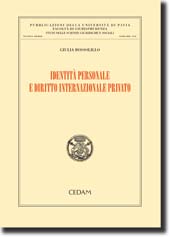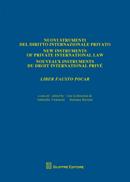The second issue of the Cuadernos de Derecho Transnacional, the Spanish online journal created by Profs. Calvo Caravaca and Carrascosa Gonzalez (see presentation post), has been published last week. The magazine, wholly available under this net address, contains articles and notes written by from authors of different nationalities (Spanish, Italian and Portuguese). All of them are summarized in an English abstract.
Table of contents (Studies)
Hilda Aguilar Grieder, “Arbitraje comercial internacional y grupos de sociedades”
Abstract: Within the framework of the companies of the group, the parties that have not signed the international contract often take part in its negotiation, execution and termination. When the aforementioned contract includes an arbitration clause, the question arises as to whether the clause would affect these non-signatories; that is to say, whether these parties are allowed to undertake legal proceedings or can have claims filed against them in court. According to the “group of companies” doctrine which is, in specific circumstances, widely accepted in arbitral and state practice, the effects of the arbitration agreement would extend to the non-signatories of the companies of the group even though they have not signed the contract in which the arbitration clause is written.
C.M. Caamiña Domínguez, “Los contratos de seguro del art. 7 del Reglamento Roma I”
Abstract: This study analyses Article 7 of the Rome I Regulation. This Article establishes the law applicable to insurance contracts covering a large risk whether or not the risk covered is situated in a Member State, and to all other insurance contracts covering risks situated inside the territory of the Member States. An insurance contract covering a large risk shall be governed by the law chosen by the parties. In the absence of choice, it shall be governed by the law of the country where the insurer has his habitual residence unless the contract is manifestly more closely connected with another country. When an insurance contract covers a non-large risk situated within the EU, party autonomy is limited. To the extent that the law applicable has not been chosen, such a contract shall be governed by the law of the Member State in which the risk is situated at the time of conclusion of the contract. In accordance with Article 7, additional rules shall apply to compulsory insurances.
A.L. Calvo Caravaca, “El Reglamento Roma I sobre la ley aplicable a las obligaciones contractuales: cuestiones escogidas”
Abstract: The Rome I Regulation has tried to improve the 1980 Rome Convention. The final result has been uneven. This study focuses on three matters. Firstly, it explains how to select the law applicable to the contract (Art. 3 Rome I Regulation). It will be a controversial regulation because of the connection between jurisdiction and applicable law as well as its opposition to the new Lex mercatoria. Secondly, consumer contracts are examined (Art. 6 Rome I Regulation). The concept of consumer contracts includes any contract concluded by a natural person with another person acting in the exercise of his trade or profession. However, it does not solve two matters: if overriding mandatory provisions are applicable to those contracts and how to protect active consumers. Lastly, although Article 9 is inspired by Article 7 of the Rome Convention, it adds two innovations: a controversial Community definition of overriding mandatory provisions, and when to give effect to overriding mandatory provisions of a different law from the one of the forum.
E. Castellanos Ruiz, “Las normas de Derecho Internacional Privado sobre consumidores en la Ley 34/2002 de servicios de la sociedad de la información y de comercio electrónico”
Abstract: The rules of private law on consumers in Directive 2000/31 of 8 June 2000 on certain legal aspects of the information society, in particular electronic commerce in the Internal Market (Directive on e-commerce) and the Act transposing the Directive on the legal Spanish Law 34/2002 of July 11, services of information society and electronic commerce are very rare, and most have a “character clarification”. These rules of private international law clarificatory highlighted in the arts. 26 and 29 of the LSSI concerning the law applicable to electronic contracts and determining the place of conclusion of contracts online, respectively.
C. Llorente Gómez de Segura, “La ley aplicable al contrato de transporte internacional según el Reglamento Roma I”
Abstract: Contracts of carriage have received a specific legal treatment under the Rome I Regulation following a trend initiated by the Rome Convention. However, Rome I has not merely introduced cosmetic changes with respect to the Rome Convention but has produced new rules particularly, although not exclusively, regarding carriage of passengers. In addition, this article aims to be a reference guide for the analysis of the Rome I general rules in order to facilitate its application to contracts of carriage.
D. Moura Vicente, “Liberdades comunitárias e Direito Internacional Privado”
Abstract: The «unity in diversity» demanded by European integration requires a system of coordination of the laws of the Member-States which is compatible with the free movement of persons, goods, services and capitals within the European Community. In recent legislative acts of the Community, as well as in the case-law of the European Court of Justice, a trend can be noticed towards the adoption of rules concerning the law applicable to private international relationships exclusively connected with the European internal market or calling for a principle of mutual recognition in the regulation of those relationships. This papers aims at determining whether and in what measure this «Private International Law of the internal market», which seems to be on the rise, involves a change of paradigm, from the standpoint of the methods and solutions that it enshrines, when compared with the common conflict of laws rules.
G. Pizzolante, “I contratti con i consumatori e la nuova disciplina comunitaria in materia di legge aplicabile alle obbligazioni contrattuali”
Abstract: The «Rome I» Regulation has converted the 1980 Rome Convention into a Community instrument. In relation to consumer contracts, the Regulation has expanded the scope of material application of Article 6. Under the new text, with certain exceptions, the special provision dealing with consumer contracts appliesto any contract entered into between a professional and a consumer, regardless of its object. This paper analyses in particular two aspects (a) the reasons that justified the modifications (b) its scope (subjective and objective) of application. It also shows the development of European consumer contract law within the whole area of European contract law and analyses the inclusion into EC directives on consumer protection of specific provisions as to their international scope in order to ensure their effective and uniform application to international consumer transactions. In fact, certain number of directives contain a provision that, although not being a conflict of laws’ rule, have an impact on the applicable law to a contract. If the contract has a direct link to the territory of one or more Member States, these provisions provide for the application of Community law even if the parties chose the law of a third country.
F. Seatzu, “La Convenzione europea dei diritti dell’uomo e le libertà di iniciativa imprenditoriale e professionale”
Abstract: This article looks at different aspects of the concept of “economic initiative” and delineate its indicia for the purpose of human rights discourse. It discusses the meaning of the notion of economic initiative as a human rights within the context of European Convention on Human Rights. The author argues that a theoretical framework is required in order to clarify how far the Convention allows public authorities to interfere with economic rights. The article addresses a number of issues, including the following questions: what is economic initiative? Is economic initiative a human rights? How are economic rights limited? How far can public authorities legitimately interfere with human rights? In order to do this, the author examines case law of the Convention organs and reflects on the result of cases in the light of the theoretical framework that has been established.
P. Zapatero Miguel, “Diplomacia y cultura legal en el sistema GATT/OMC”
Abstract: The GATT/WTO system has evolved from a diplomacy-based system to a rule-oriented system. This cultural process in which lawyers finally triumphed over diplomats as key professionals running the regime was the direct result of an internal battle over technical qualifications inside the GATT that lasted several decades. Legal techniques have significantly reinforced the multilateral trading system
in comparative institutional terms. However, incremental legalization and judicialization has inevitably broadened the scope of trade justiciability, reaching a critical point that generates some criticism and concern. From the point of view of institutional design, this flexible and adaptative regime is among the most powerful and advanced multilateral artifacts in international legal arquitecture.
A Varia section follows, also enclosing English abstracts.
 Last week-end, Dr. Dieter Krombach was found in the street, tied up, in front of a court in Mulhouse, France, in the middle of the night.
Last week-end, Dr. Dieter Krombach was found in the street, tied up, in front of a court in Mulhouse, France, in the middle of the night. The receiver then sought to enforce the order of July 25, 2000, in a ski resort in France, where Blech owned a property. In 2003, the competent first instance court of Thonon-les-Bains (French Alps) declared the American judgment enforceable. The judgment was confirmed by the Chambery Court of Appeal in 2006. Blech appealed to the Cour de cassation.
The receiver then sought to enforce the order of July 25, 2000, in a ski resort in France, where Blech owned a property. In 2003, the competent first instance court of Thonon-les-Bains (French Alps) declared the American judgment enforceable. The judgment was confirmed by the Chambery Court of Appeal in 2006. Blech appealed to the Cour de cassation.
 An interesting conference on issues relating to name and personal identity in private international law and EU law will be hosted by the Faculty of Law of the
An interesting conference on issues relating to name and personal identity in private international law and EU law will be hosted by the Faculty of Law of the 
